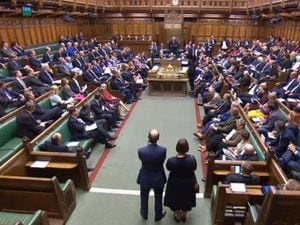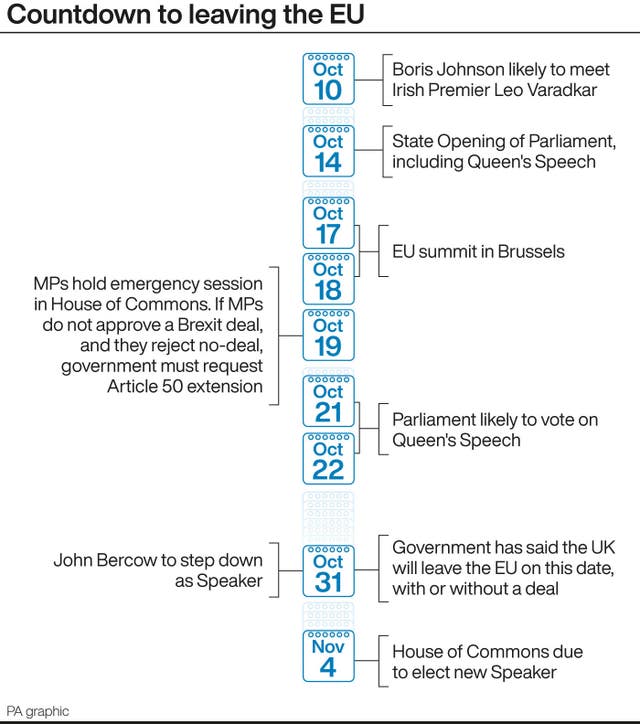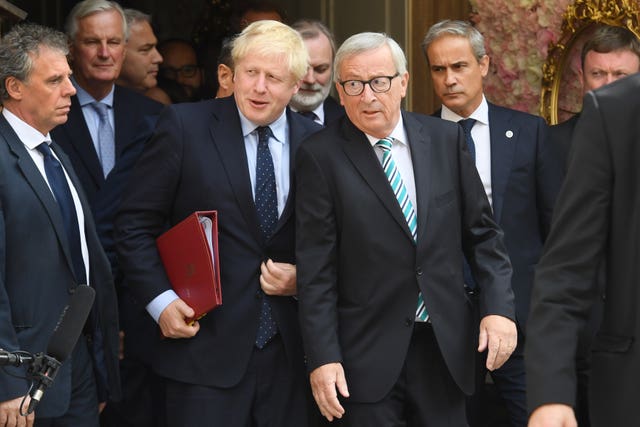MPs to be summoned to Westminster for Commons Brexit showdown
Boris Johnson is preparing to call a special Saturday sitting of Parliament after next week’s crucial EU summit.

Ministers are preparing to summon MPs for a special Saturday sitting of Parliament following next week’s crucial EU summit.
Government sources said MPs were expected to be called back to Westminster on October 19 regardless of whether Boris Johnson has been able to secure agreement on a Brexit deal
The summit in Brussels on October 17 and 18 is the last scheduled meeting of EU leaders before Britain is supposed to leave on October 31.
If the Prime Minister is able to get an agreement, it will be an opportunity for MPs – who will have to give their approval – to debate it.
Otherwise, Mr Johnson is expected to set out how he plans to take Britain out of the EU at the end of the month regardless.
Labour leader Jeremy Corbyn said the sitting would be an opportunity for MPs to press the Prime Minister to comply with the so-called Benn Act requiring him to seek a further Brexit delay if there is no agreement at the summit.
“The idea that the Prime Minister will break the law yet again is something that needs to be borne in mind here,” he told reporters during a visit to a wind turbine facility in Southampton.
The move comes after judges at the Court of Session in Edinburgh said they would not rule on a legal bid requiring a request for an extension to be submitted in the event that there is no agreement at the summit until October.
Mr Johnson has repeatedly said that while he will abide by the law, he will be taking the UK out of the EU on October 31, with or without a deal.
The prospects of an agreement were looking slim after Downing Street accused the EU on Tuesday of making it “essentially impossible” for the UK to leave with a deal.
Mr Johnson is expected to meet Irish Premier Leo Varadkar on Thursday in a last-ditch effort to break the deadlock over the Northern Ireland backstop, which continues to stand in the way of an agreement.
But after speaking to Mr Johnson by telephone on Tuesday, Mr Varadkar warned that it would be “very difficult” to get an agreement in time for next week.

While the Irish Government and the EU were working to get an agreement, he said they were not prepared to do a deal “at any cost”.
“There are some fundamental objectives that haven’t changed for the past three years and we need them guaranteed,” he told RTE news.
“I think it is going to be very difficult to secure an agreement by next week, quite frankly.
“Essentially what the United Kingdom has done is repudiate the deal that we negotiated in good faith with Prime Minister (Theresa) May’s government over two years and sort of put half of that now back on the table and are saying ‘That’s a concession’. And of course it isn’t really.”
The meeting with Mr Varadkar comes in the wake of a series of acrimonious exchanges between London, Dublin and Brussels.
Number 10 sources have accused the Irish premier of going back on a commitment to find a deal by the end of October.
There was also a “frank” exchange of views between Mr Johnson and German Chancellor Angela Merkel in a telephone call on Tuesday.
Afterwards, unnamed Downing Street sources claimed Mrs Merkel had made clear an agreement was “overwhelmingly unlikely”.
She was said to have told Mr Johnson that if the UK was leaving the EU, it would have to leave Northern Ireland behind in a customs union.

It prompted European Council president Donald Tusk to accuse Mr Johnson of engaging in a “stupid blame game”.
European Commission president Jean-Claude Juncker said that if the negotiations failed, “the explanation will be found in the British camp (because) the original sin is found on the islands and not on the continent”.
He told the French Les Echos newspaper that in such an event, both sides would suffer.
“A no-deal Brexit would lead to a collapse of the United Kingdom and a weakening of growth on the continent,” he said.




